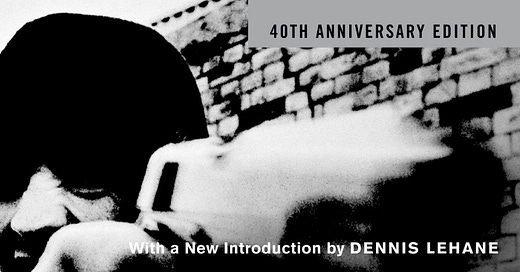“Always a pleasure to do a favor for a friend with a good memory.”
So says the titular character halfway through The Friends of Eddie Coyle. Eddie has just dropped a dime on one of his suppliers, a young gun runner dealing everything from .38 revolvers to M-16s. Nice enough kid, but Eddie’s facing a prison sentence for his part in transporting a stolen shipment of Canadian Club. Ratting out his gun supplier might be enough to keep him out of a cell.
In Eddie Coyle’s world, a friend is someone who can do you a favor. Depending on the needs of the moment, that could be a fed, a bartender, a gunrunner, a bank robber, or any other number of disreputable characters. Author George V. Higgins, whose contemporary reputation largely hangs on this novel, tells the story almost entirely through dialogue, like this exchange which opens the novel:
Jackie Brown, at twenty-six, with no expression on his face, said that he could get some guns. “I can get your pieces probably by tomorrow night. I can get you, probably, six pieces. Tomorrow night. In a week or so, maybe ten days, another dozen. I got a guy coming in with at least ten of them but I already talk to another guy about four of them and he’s, you know, expecting them. He’s got something to do. So, six tomorrow night. Another dozen in a week.”
The stocky man sat across from Jackie Brown and allowed his coffee to grow cold. “I don’t know as I like that,” he said. “I don’t know as I like buying stuff from the same lot as somebody else. Like, I don’t know what he’s going to do with it, you know? If it was to cause trouble to my people on account of somebody else having some from the same lot, well, it could cause trouble for me, too.”
It’s not hard to imagine this same exchange showing up in an Elmore Leonard novel or on an episode of The Sopranos. It has become so much the standard register in a particular style of crime fiction that, reading Higgins today, it’s difficult to fully appreciate just how groundbreaking and revelatory his dialogue actually was. Leonard, for example, was effusive about his admiration for Higgins work, and The Friends of Eddie Coyle in particular, which he called “the best crime novel ever written.”
Yet Higgins’ legacy is hard to pin down. Despite writing more than two dozen novels, none have achieved the fame or longevity of Eddie Coyle. Even Higgins himself may have been vexed by this. In Dennis Lehane’s introduction to Picador’s 40th anniversary edition of the novel, he writes:
No one, before or since, has ever written dialogue this scabrous, this hysterically funny, this pungently authentic—not Elmore Leonard, who cites this novel as a primary influence, not Richard Price, not even George V. Higgins himself, who spent the rest of his career trying to fix what wasn’t broken, attempting to refine his dialogue in subsequent novels to such a degree of phonetic miscalculation that it became a near parody of the mastery on display here.
Which raises the question: Is Eddie Coyle really a masterpiece? Or is the book’s reputation fueled by the fact that it was simply one of the first crime novels to perform a trick that has since become de rigueur?
Keep reading with a 7-day free trial
Subscribe to Cold Caller Magazine to keep reading this post and get 7 days of free access to the full post archives.




